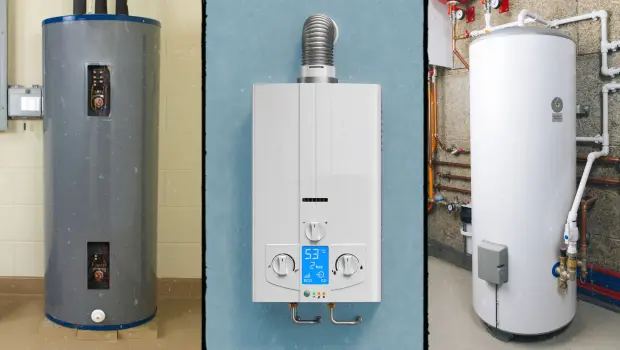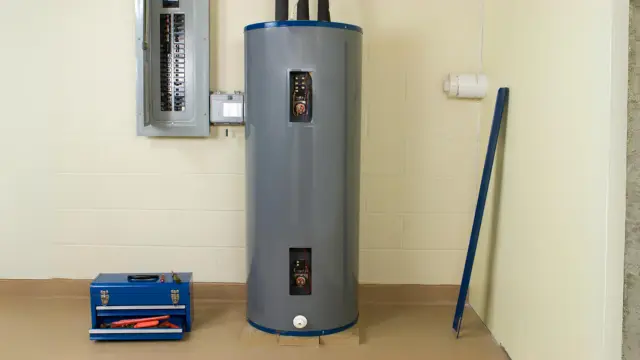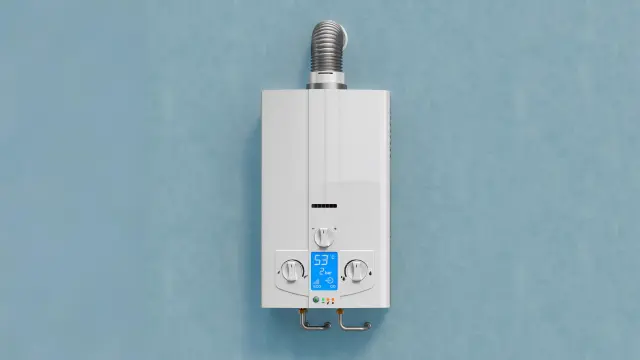
How Much Does it Cost to Replace a Hot Water Heater in Spring Branch, TX? [2024]
A water heater is an essential component of any household, providing hot water for various daily tasks such as showering, washing dishes, and laundry. However, like any other appliance, water heaters have a lifespan and will eventually need to be replaced. The water heater replacement cost in Spring Branch, Texas can vary greatly, depending on factors such as the type and size of the heater, the location of installation, and the local labor costs.
This article offers a comprehensive guide on the costs involved in replacing a water heater, including the impact of different variables, types of heaters, and additional expenses that might arise during the installation process.
Claim Your Free Quote Today
Every water heater job is different. Our Spring Branch Water Heater Contractors can get you an accurate and fair quote for free today.
The Cost of Water Heater Installation in Spring Branch
Cost By Type
Let's explore the costs associated with different types. Whether you're drawn to the efficiency of electricity, the reliability of gas, the eco-friendliness of solar, or the compactness of propane, each choice paints a unique landscape of benefits and costs.

Tank Water Heaters
30-gallon Tank Electric Water Heater
Suitable for 1 to 2 people household.
| Low | High | |
|---|---|---|
| Equipment Cost | $394.83 | $532.87 |
| Labor Cost | $278.11 | $337.54 |
| Job Supplies | $79.26 | $90.68 |
| Debris Disposal (Optional) | $28.41 | $32.05 |
| Totals | $781 | $993 |
40-gallon Tank Electric Water Heater
Suitable for 2 to 4 people household.
| Low | High | |
|---|---|---|
| Equipment Cost | $423.2 | $778.93 |
| Labor Cost | $324.42 | $393.91 |
| Job Supplies | $79.57 | $90.86 |
| Debris Disposal (Optional) | $28.37 | $32.7 |
| Totals | $856 | $1296 |
50-gallon Tank Electric Water Heater
Suitable for 5 to 7 people household.
| Low | High | |
|---|---|---|
| Equipment Cost | $502.61 | $847.03 |
| Labor Cost | $371.59 | $449.18 |
| Job Supplies | $79.35 | $90.57 |
| Debris Disposal (Optional) | $28.47 | $32.72 |
| Totals | $982 | $1420 |
75-gallon Tank Electric Water Heater
Suitable for 7+ people household.
| Low | High | |
|---|---|---|
| Equipment Cost | $1133.89 | $1310.83 |
| Labor Cost | $417.05 | $506.23 |
| Job Supplies | $79.46 | $90.42 |
| Debris Disposal (Optional) | $28.38 | $32.49 |
| Totals | $1659 | $1940 |
Claim Your Free Quote Today
Every water heater job is different. Our Spring Branch Water Heater Contractors can get you an accurate and fair quote for free today.

Tankless Water Heaters
0.9-gmp to 3.5-gpm Tankless Electric Water Heater
Suitable for 1 to 2 people household.
| Low | High | |
|---|---|---|
| Equipment Cost | $168.12 | $345.55 |
| Labor Cost | $278.83 | $337.33 |
| Job Supplies | $30.19 | $34.59 |
| Equipment Allowance | $38.41 | $58.24 |
| Remove Water Heater (Optional) | $27.12 | $123.32 |
| Debris Disposal (Optional) | $35.64 | $40.61 |
| Totals | $578 | $940 |
3.5-gmp to 6-gpm Tankless Electric Water Heater
Suitable for 2 to 4 people household.
| Low | High | |
|---|---|---|
| Equipment Cost | $417.97 | $739.31 |
| Labor Cost | $371.26 | $449.49 |
| Job Supplies | $30.62 | $34.51 |
| Equipment Allowance | $38.22 | $58.04 |
| Remove Water Heater (Optional) | $27.92 | $123.93 |
| Debris Disposal (Optional) | $35.64 | $40.76 |
| Totals | $922 | $1446 |
7-gpm Tankless Electric Water Heater
Suitable for 5+ people household.
| Low | High | |
|---|---|---|
| Equipment Cost | $591.13 | $985.53 |
| Labor Cost | $463.67 | $562.57 |
| Job Supplies | $30.01 | $34.32 |
| Equipment Allowance | $38.5 | $58.06 |
| Remove Water Heater (Optional) | $27.64 | $123.22 |
| Debris Disposal (Optional) | $35.24 | $40.52 |
| Totals | $1186 | $1804 |
Claim Your Free Quote Today
Every water heater job is different. Our Spring Branch Water Heater Contractors can get you an accurate and fair quote for free today.
Claim Your Free Quote Today
Every water heater job is different. Our Spring Branch Water Heater Contractors can get you an accurate and fair quote for free today.
Factors Influencing Water Heater Installation Costs
Understanding the water heater installation cost is about understanding the myriad factors that weave into the final tapestry of costs. Let's dive deep into the elements that shape the investment in your home's comfort and efficiency.
Water Heater Size
The size or capacity of the water heater significantly influences its cost. Tank-style heaters range from 20 gallons to upwards of 100 gallons. The larger the tank, the higher the cost. As a rule of thumb, a two or three-person household usually requires a water heater that holds or heats 40 to 50 gallons while larger families may need a larger tank.
Fuel Type
The type of fuel that the heater uses also affects the cost of water heater replacement in Spring Branch, Texas. Electric, natural gas, and propane water heaters all start at around $600, but costs rise depending on the model's complexity.
Location and Accessibility
The location of the water heater within the home can also impact the cost of replacing water heaters. If the water heater is in a difficult-to-reach place, additional costs may be added to the installation price.
Innovative Features
Today's water heaters come adorned with features that whisper of the future—energy-saving technologies that promise lower bills, smart controls that obey your every command, and anti-scale systems that protect the heart of your heater. While these advancements offer a symphony of convenience and efficiency, they require a conductor skilled in the art of intricate installation, thus elevating the cost.
Labor Costs
Labor is a significant part of a water heater replacement cost in Spring Branch, usually accounting for about 50% of the total, but costs vary based on how long the job takes.
Additionally, depending on your local regulations, you might need permits for water heater installation, which can involve additional time and effort for the installer, translating to higher costs.
Permits and Regulations
The sea of local regulations holds the buoys of permits and codes, guiding your installation toward safe harbors. Adhering to these standards is a voyage in itself, often requiring additional time and expertise from your installation crew, a journey reflected in the overall cost. These legal navigations ensure your water heater's story is one of safety and harmony with community standards.
Plumbing
Sometimes, your home's plumbing, the silent rivers within the walls, must evolve to embrace your new water heater. Upgrading pipes, welcoming new water lines, or calibrating the water pressure are chapters that may be added to your installation story, each with its impact on the budget.
Regional Variations
The cost of installing a water heater is a story written in the dialect of your region. The economic landscape, from labor rates to material costs, colors the narrative, making each installation a unique reflection of its geographical canvas.
Ventilation
Electric water heaters usually don't need venting, but gas or propane water heaters do. There are two types of venting systems: direct or power. Direct-vent heaters, which use a passive venting system, are less expensive and use an exhaust pipe or chimney. Power-vent heaters are more expensive, using a fan or blower plus electricity.
Claim Your Free Quote Today
Every water heater job is different. Our Spring Branch Water Heater Contractors can get you an accurate and fair quote for free today.
Signs Your Water Heater Needs to be Replaced
Understanding when to replace your water heater is key to maintaining a seamless and efficient home environment. Here’s a straightforward guide to recognizing the telltale signs that suggest it's time for an upgrade.
Age
Typically, water heaters provide reliable service for 8 to 12 years, but beyond this time frame, they become more prone to problems. As such, if your water heater is nearing or has exceeded this age range, it's wise to start considering a replacement. This proactive step can help ensure your home continues to have a dependable hot water supply while avoiding the inconvenience of unexpected failures.
Performance
When you consistently encounter lukewarm water, it's a telltale sign that your water heater may be losing its efficiency, which often points to underlying issues. This drop in performance can be attributed to potential culprits such as a malfunctioning heating element or the accumulation of sediment within the tank. Addressing these issues promptly can help restore your water heater's functionality and ensure a steady supply of hot water.
Efficiency
An unexpected rise in energy bills, despite no change in usage habits, frequently signals a decline in your water heater's efficiency. This is particularly true for older units, which may need to exert more effort to heat water as they age, thereby consuming more energy. Recognizing this pattern can help you identify when your water heater is becoming less efficient and may need attention or replacement to ensure optimal performance and energy use.
Integrity
Finding moisture or puddles around your water heater is a cause for immediate concern, signaling potential leaks. What might seem like minor leakage can quickly escalate, leading to significant water damage if left unaddressed. It's crucial to act swiftly to mitigate these risks and preserve the integrity of your home's infrastructure.
Sound
Unusual noises emanating from your water heater, such as rumbling or popping sounds, are often indicative of sediment buildup within the unit. If these sounds persist even after attempts to flush the system, it could signal that your water heater is approaching the end of its useful life. Such persistent noise not only highlights the need for maintenance but may also necessitate considering a replacement to ensure a continuous and efficient hot water supply.
Purity
Unpleasant odors in your hot water are often a sign of bacterial growth within the water heater's tank. While regular maintenance might temporarily alleviate the issue, persistent foul smells could indicate a more serious problem, suggesting that it might be time to consider replacing the unit. This step ensures the health and safety of your home's water supply, maintaining the comfort and well-being of its occupants.
Structure
Discolored water from the hot tap or visible signs of rust on your water heater tank are clear indicators of internal corrosion. Such rust and corrosion can significantly compromise the integrity of the tank, potentially leading to leaks and other serious issues. In these cases, replacing the compromised unit becomes necessary to maintain the safety and efficiency of your home's hot water system.
Physical Condition
Physical damage to your water heater, including dents, cracks, or problems with the pressure relief valve, can significantly impair its functionality and compromise safety. In situations where the unit's structural integrity is in question, prioritizing safety is paramount. Consequently, investing in a new water heater often emerges as the most prudent decision, ensuring the efficient and safe operation of your home's hot water system.
Differentiating Between Tank and Tankless Water Heaters
There are two primary types of water heaters - tank and tankless. A traditional tank water heater stores water in a large tank, typically holding anywhere from 20 to 100 gallons of water. These are the most common type of water heater, found in 90% of households.
On the contrary, tankless water heaters, although increasingly popular, are more costly. They have a coil system for heating water and are generally mounted on the wall. These models are compact and efficient but can cost almost twice as much as a conventional tank water heater.
DIY vs. Professional Installation
Choosing to install a water heater yourself might look like a way to save money upfront, but it can lead to costly fixes down the line. Professionals ensure the installation is done right, adhering to safety and efficiency standards. They also navigate local building codes, reducing the risk of issues later. For peace of mind and long-term savings, professional installation is the clear choice.
Claim Your Free Quote Today
Every water heater job is different. Our Spring Branch Water Heater Contractors can get you an accurate and fair quote for free today.
Water Heater Replacement Cost FAQ
Here we address some common questions that arise when considering the cost of replacing a water heater.
How long does it take to install a water heater?
On average, a hot water heater should take a water heater professional in Spring Branch two to three hours to install.
What is considered old for a water heater?
With regular inspection, draining, and flushing, most water heaters in Spring Branch last anywhere from 8 to 12 years, and electric water heaters last a bit longer, from 10 to 15 years.
How long should I wait to run water after a new water heater?
After installing a new water heater in your Spring Branch home, waiting 30 minutes to an hour is generally recommended before running water through it.
How do I prepare for a new water heater installation?
The best step a Spring Branch homeowner can take for water heater installation is to turn off the gas supply or electricity to their existing water heater.
Final Thoughts
While the cost to replace a water heater can vary, understanding the different factors that contribute to the overall cost can help you budget accordingly.
Whether you prefer an Electric Tank Water Heater, Gas Tank Water Heater, Electric Tankless Water Heater, or Gas Tankless Water Heater, you're bound to find a solution that fits your household's needs and budget.
Claim Your Free Quote Today
Every water heater job is different. Our Spring Branch Water Heater Contractors can get you an accurate and fair quote for free today.